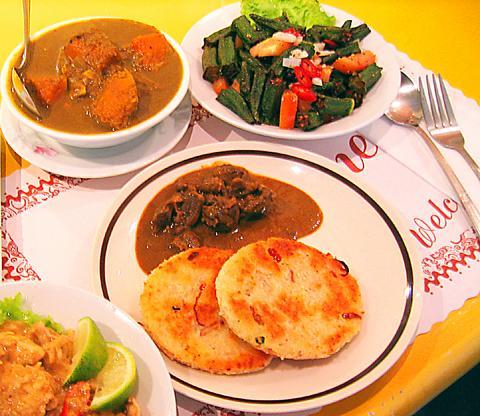Downtown-dwelling Indian curry lovers fed up to the back teeth with having to fork out thousands of NT dollars for a run-of-the-mill slap-up meal should take a trip across the "Gulf of Manner," or the Waishuang River (外雙溪) and check out the Lanka Restaurant.
Located opposite Yangming Hospital (陽明醫院), the restaurant was opened by Damian Chee (齊興盛), an overseas Chinese from Sri Lanka whose father once owned a Chinese restaurant in Colombo, 15 years ago.

PHOTO: GAVIN PHIPPS , TAIPEI TIMES
Once a hangout for illegal Sri Lankan workers until the early 1990s, when many of them were deported, the joint has built up a reputation with both locals and expats alike as one of the cheapest and tastiest authentic curry joints in town.
At the Lanka, diners can forget about the fancy trappings of many a Taipei curry eatery, as the interior is sparsely decorated and the fittings are not that far removed from your average local mom-and-pop diner. But then the Lanka, unlike the lush green mountainous country from whence its proprietor hails is not a place to enjoy vistas -- it is a place to eat.
Using two different types of curry powder -- regular and roasted -- and with the addition of differing proportions of spices such as cardamom, cumin and coriander as well as coconut milk, Sri Lankan curries are lighter than their gee- and yogurt-heavy Indian brethren.
The Lanka's menu is extensive, offering diners the choice of a selection of set meals which cost from NT$175 to NT$200, or individual dishes which cost an average of NT$150. Mildly spicy meat dishes cost NT$130 while the varied selection of vegetable curries -- -- which include spinach, potato, lentil, a tasty pumpkin and an interesting mushroom and cashew nut -- cost between NT$90 and NT$110.
For diners looking to experiment, then one of Chee's sambols, or Sri Lankan salads, makes for a refreshing way to begin any meal. Costing from NT$90 to NT$110, the zesty chili and lemon-loaded salads are available in half a dozen varieties, of which the okra comes highly recommended. Other traditional Sri Lankan treats include spiced tomato palandies (NT$230 - NT$250) and poories NT$140/60), or lightly fried bread.
Unlike Indian eateries, where the nan bread is king, at the Lanka it is the roti that supplements the meal, at NT$70 for a pair.

A vaccine to fight dementia? It turns out there may already be one — shots that prevent painful shingles also appear to protect aging brains. A new study found shingles vaccination cut older adults’ risk of developing dementia over the next seven years by 20 percent. The research, published Wednesday in the journal Nature, is part of growing understanding about how many factors influence brain health as we age — and what we can do about it. “It’s a very robust finding,” said lead researcher Pascal Geldsetzer of Stanford University. And “women seem to benefit more,” important as they’re at higher risk of

Last week the Democratic Progressive Party (DPP) said that the budget cuts voted for by the China-aligned parties in the legislature, are intended to force the DPP to hike electricity rates. The public would then blame it for the rate hike. It’s fairly clear that the first part of that is correct. Slashing the budget of state-run Taiwan Power Co (Taipower, 台電) is a move intended to cause discontent with the DPP when electricity rates go up. Taipower’s debt, NT$422.9 billion (US$12.78 billion), is one of the numerous permanent crises created by the nation’s construction-industrial state and the developmentalist mentality it

Eric Finkelstein is a world record junkie. The American’s Guinness World Records include the largest flag mosaic made from table tennis balls, the longest table tennis serve and eating at the most Michelin-starred restaurants in 24 hours in New York. Many would probably share the opinion of Finkelstein’s sister when talking about his records: “You’re a lunatic.” But that’s not stopping him from his next big feat, and this time he is teaming up with his wife, Taiwanese native Jackie Cheng (鄭佳祺): visit and purchase a

Experts say that the devastating earthquake in Myanmar on Friday was likely the strongest to hit the country in decades, with disaster modeling suggesting thousands could be dead. Automatic assessments from the US Geological Survey (USGS) said the shallow 7.7-magnitude quake northwest of the central Myanmar city of Sagaing triggered a red alert for shaking-related fatalities and economic losses. “High casualties and extensive damage are probable and the disaster is likely widespread,” it said, locating the epicentre near the central Myanmar city of Mandalay, home to more than a million people. Myanmar’s ruling junta said on Saturday morning that the number killed had